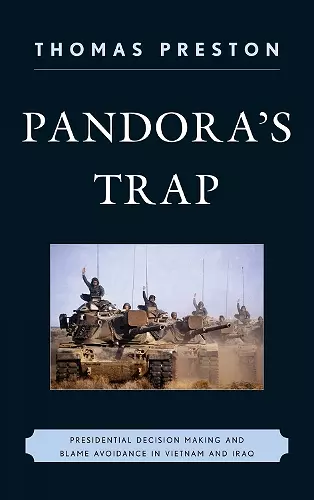Pandora's Trap
Presidential Decision Making and Blame Avoidance in Vietnam and Iraq
Format:Paperback
Publisher:Rowman & Littlefield
Published:1st Dec '13
Currently unavailable, and unfortunately no date known when it will be back
This paperback is available in another edition too:
- Hardback£98.00(9780742562639)

How important is presidential personality and leadership style in foreign policy decisions? To answer this question, Thomas Preston takes readers inside the Bush administration's decision-making process and use of intelligence to better understand how administration officials justified the Iraq War—and how they sought to avoid blame for the consequences of their actions. Based on extensive interviews with key Bush administration officials, Preston offers students of American foreign policy, presidential decision making, the dynamics of blame avoidance, and future practitioners with an in depth examination of how presidential personality and leadership style impacted Bush's central foreign policy failure. In addition, Preston looks critically at the oft-cited comparisons of Iraq to Lyndon Johnson's leadership during the Vietnam War, exploring where the analogy fits and a number of important differences. He shows how both presidents' styles exacerbated their managerial weaknesses in these cases and the limits of blame avoidance strategies. The book provides a cautionary tale for future leaders to consider more carefully the long-term consequences of satisfying their short term policy desires by lifting the lid to any new Pandora's trap.
Thomas Preston illuminates the unattractive underside of the making of U.S. foreign policy. He shows how and why the public face of some major decisions has diverged substantially from the inside reality. -- Paul R. Pillar, Georgetown University
Preston's work adds significantly to the key scholarly debate in presidential studies over whether institutional forces or idiosyncratic aspects of each president determine policy outcomes. The author argues that 'leaders matter!' Preston uses his earlier work on leadership style to compare the decision-making styles of Lyndon Johnson during Vietnam and George W. Bush during the Iraq War. Though the political contexts of Vietnam and Iraq differed greatly, the Johnson and G.W. Bush decision-making styles were similar enough--lack of foreign policy experience, lack of nuanced thinking, passionate belief that they were right, and insular decision making--that both followed a path to intervention. The book is theoretically elegant and empirically dense. Rooted in literature on cognitive styles, the theoretical structure is based on two frameworks. The first measures the leader's need for control and his prior experience in the policy area. The second measures the leader's sensitivity to context and conceptual complexity. Through this framework a typology of leadership styles is developed for use in comparing actual decision making in case studies, here Iraq and Vietnam. An outstanding contribution to the literature. Summing Up: Highly recommended. All readership levels. * CHOICE *
ISBN: 9780742562646
Dimensions: 227mm x 150mm x 17mm
Weight: 390g
280 pages